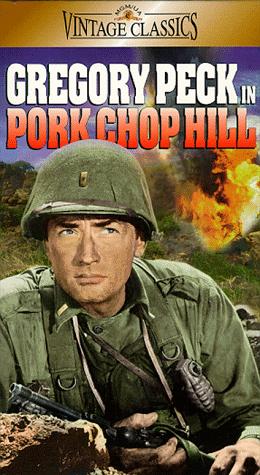

Pork Chop Hill (1959)
A grim, harrowing film detailing a single brutal Korean War battle, Pork Chop Hill was directed by Lewis Milestone and is the third entry in his informal trilogy devoted to 20th-century military conflict. All Quiet on the Western Front (1929) was set during WWI, and A Walk in the Sun (1945) during WWII. Based on an actual event, it stars Gregory Peck as commander of an infantry company that is ordered to take Pork Chop Ridge, an inconsequential tactical objective. Compounding the seeming pointlessness of the assignment are the Panmunjom peace talks, which the troops believe may end the war at any minute, so that they are reluctant to participate in what may be its final battle.
The film is an ode to the common American infantryman, soldiers who manage to retain their honor and dignity despite being ordered into an insane action by a top brass who are unwilling to lose face to the enemy, even though the conflict's end appears imminent. Peck is outstanding as the resolute but compassionate commander, and Rip Torn, Harry Guardino, Woody Strode, James Edwards (veteran of Sam Fuller's excellent Korean War film The Steel Helmet, 1950), and Robert Blake provide solid support. Moreover, Milestone employs his considerable technical skills to create an authentic and memorable cinematic experience, projecting a grim realistic air that captures the forlorn atmosphere of the meaningless mission. Sam Leavitt's photography is topnotch and depicts this heroic battle in such stark detail that the viewer can almost smell the acrid fumes of cordite and taste the dust blown from the dead ridge.
Performer, Character
Gregory Peck, Lt. Clemons
Harry Guardino, Forstman
Rip Tor, Lt. Russell
George Peppard, Fedderson
James Edwards, Cpl. Jurgens
Bob Steele, Kern
Woody Strode, Franklin
George Shibata, Lt. O'Hashi
Norman Fell, Sgt. Coleman
Robert Blake Velie
Martin Landau, Marshall
Harry Dean Stanton, MacFarland
Gavin McLeod, Saxon
Production Credits
Producer, Sy Bartlett
Director, Lewis Milestone
Screenwriter, James R. Webb based on a story by S.L.A. Marshall
Editor, George Boemler
Cinematographer, Sam Leavitt
Technical Advisor, Joseph G. Clemons Jr.